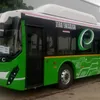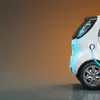This Bengaluru startup is building an extensive EV charging network through kirana stores
Dheeraj Reddy, Sameer Ranjan Jaiswal, and Yugraj Shukla established Charzer in 2020 — a smart, compact IoT-powered station, and a mobile app, to provide easy access to charging facilities.
With mankind experiencing the negative effects of climate change on an everyday basis, a lot of focus is now being laid on clean mobility, especially electric vehicles. According to the Society of Manufacturers of Electric Vehicles (SIAM), the sale of EVs, including e-rickshaws in India, increased by 20 percent in the fiscal year 2019-20. Besides, recently, the government also set a target to ensure at least 30 percent of the automobiles are EVs.
There is a slew of advantages in using fossil-fuel-free vehicles – from better energy security, improved fuel economy, lower fuel costs, to a drop in emissions. The awareness regarding this is also gradually rising.

The sale of EVs increased by 20 percent in the fiscal year 2019-20.
Image credit: Shutterstock.
Yet, multiple hurdles, including a lack of charging infrastructure, inadequate funds in the ecosystem, and anxiety around the resale value of vehicles, stand in the way of EV adoption in the country.
To address this issue, Dheeraj Reddy, Sameer Ranjan Jaiswal, and Yugraj Shukla established in 2020. The co-founders developed a smart, compact IoT-powered station called Kirana Charzer, as well as a mobile app to provide easy access to charging facilities.
The charging station designed by the startup can be hosted by kirana stores, small shops, or restaurants, thus enabling them to earn an additional source of income. The mobile app, on the other hand, allows both vehicle owners and hosts to track payments and the amount of electricity consumed.

Sameer Ranjan Jaiswal, co-founder, Charzer.
“Through our research and experience, we realised that India’s EV market was being held back due to the dearth of charging infrastructure. The latest report by Bloomberg New Energy Finance (BNEF) also points out the same. Thus, we decided to build a model that can bridge the gap, and also has the potential to be scaled up,” says Sameer Ranjan Jaiswal, Co-founder, Charzer.
The beginning
Dheeraj, Sameer, and Yugraj are not new to the world of entrepreneurship. Earlier in 2017, the trio had founded Fae Bikes — an electric bike-sharing startup to promote faster EV adoption in India.
However, after two years, they realised the need to create simple, easy charging experiences for customers.
“One of my friends, who owns an EV, ran out of charge while he was travelling to work in Bengaluru. He was stuck somewhere between BTM Layout and ITPL. He tried requesting some individuals who were running retail outlets and random shops along the route to allow him some space to charge. Though he was carrying a portable charger with him, most of them refused to help. And, after the incident, he was determined to never use an EV again,” recalls Sameer.
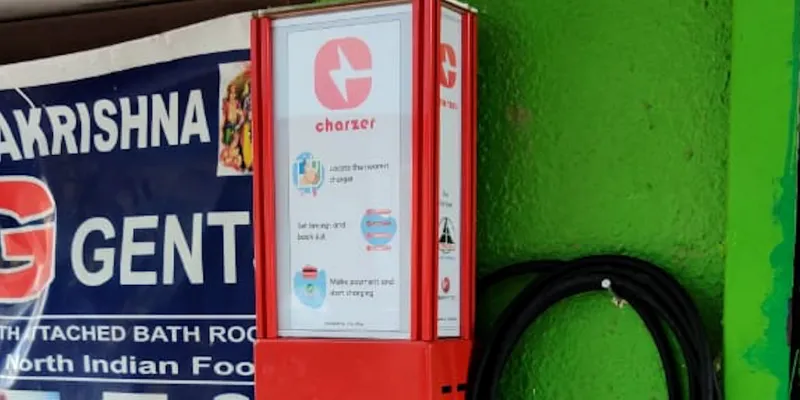
The charging station developed by Charzer.
After listening to this ordeal, the three techies sowed the seeds for Charzer. They spent close to six months doing research and interacting with other EV startups, Original Equipment Manufacturers (OEMs), and retail chains. The co-founders also directed their energy towards building multiple product iterations, technologies, and conceiving the business model.
“We had to work on the charging station, taking into consideration many limitations such as poor network connectivity, non-availability of three-phased electric supply, and the inability of kirana store owners to pay a high upfront price,” notes Sameer.
In February 2020, the trio presented their plan and prototype at MOVE (Mobility Re-imagined) — an event, where key stakeholders across the mobility value chain meet to discuss the future of the sector. The startup not only received an overwhelming response but also bagged over 200 pre-orders for Kirana Charzer.
Though Charzer was initially bootstrapped, marquee investors Rakesh Saraf, Gaston Bilder, and Kiran Kamity placed their bets on the startup.
How the charging network works
Kirana Charzer is a charging station that can charge electric scooters, cars, and three-wheelers. The product was contrived in a way, in which it can be easily hosted and installed by small shops, restaurants, commercial units, paying guests, and more.

Image credit: Charzer.
“The charging units are Level 2 AC equipment with a 3.3 KW capacity. They are enabled by IoT and have an inbuilt smart meter. Our on-call technicians fix and install the station for free as and when an interested party places an order on our website, email, or WhatsApp,” Sameer says.
Since the charging station is connected to a central server, the charging host can monitor all the data regarding the amount of electricity consumed, the time period for which it is used, the earnings they receive from it, and so on.
Furthermore, it enables the EV owners to locate the nearest charging station through GPS, book a slot for the service, and make payments. For every one hour of charging, the EV owner needs to pay anywhere between Rs 20 and Rs 50, as set by the charging host.
The station can function effectively with one-phase electric supply because of its ability to limit the extraction of power as per the host’s connection. In fact, the Kirana Charzer is dust and water-proof, which enables it to function in any weather condition.
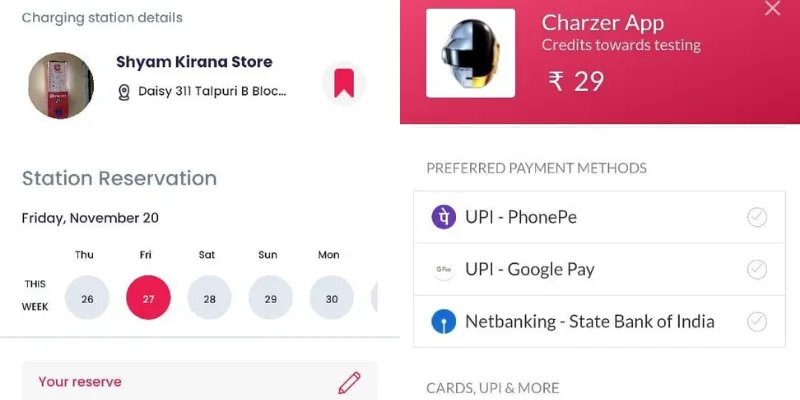
A screenshot from the mobile app.
To help hosts and EV owners to track these specifics real time, the startup has developed a mobile app called Charzer. The application — which is available on Android — is completely free of cost. The charging stations use the mobile app to transmit the data to areas with poor internet connectivity as well.
“The app was built keeping in mind the requirements of both the hosts and EV owners. Generally, charging stations are embedded with screens that display details like consumption of electricity, voltage, price, etc. However, since we wanted to make a cost-effective product, we eliminated it, and created an app to present the same information,” says Sameer.
The app permits hosts to add their business details, switch on/off their charger from the network and withdraw money to enable the direct transfer of the earnings to their bank account.
Kirana Charzer can be bought by shops and kirana stores at a one-time price of Rs 10,000. However, the model is such that every time an EV owner charges their vehicle, the earnings are distributed between the host and the startup (80 percent for kirana owners and 20 percent for Charzer).
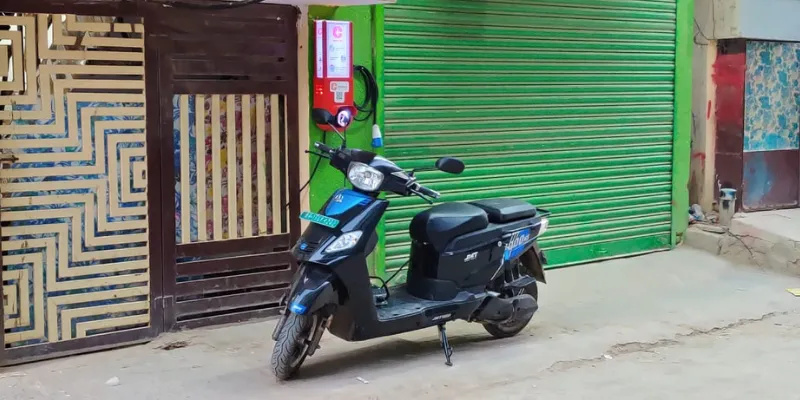
An electric two-wheeler being charged using Kirana Charzer.
The startup has outsourced the manufacturing of its charging stations to two production units located in Bengaluru and Chennai.
EV usage can bring people a step closer to making the world a cleaner and greener place. Reduced greenhouse gas emissions, better air quality, and healthier living are the positive impacts it can produce. And, Charzer is aiming to boost the EV ecosystem by offering access to charging infrastructure on the go.
"Since I live in PG accommodation, finding a charging station was a big hassle for me. Before Charzer, there were no options available for EV owners. Even if we did find a local store or a garage to charge it, the pricing was quite high and not standardised. Now, because of the startup, I just have to walk a few metres till the grocery store to charge my vehicle,” says Kishore, a working professional who resides in Electronics City in Bengaluru.
So far, Charzer has set up five charging stations – three in Bengaluru and two in Trivandrum. At present, 50 of them are in the process of getting installed. Besides, the team has already garnered 4,000 pre-orders from kirana stores and shops in eight states and 64 cities across India. In addition to paving the way for clean mobility, the startup is excited about enhancing the livelihood and income of kirana stores and retail outlets in the country.
Edited by Suman Singh


